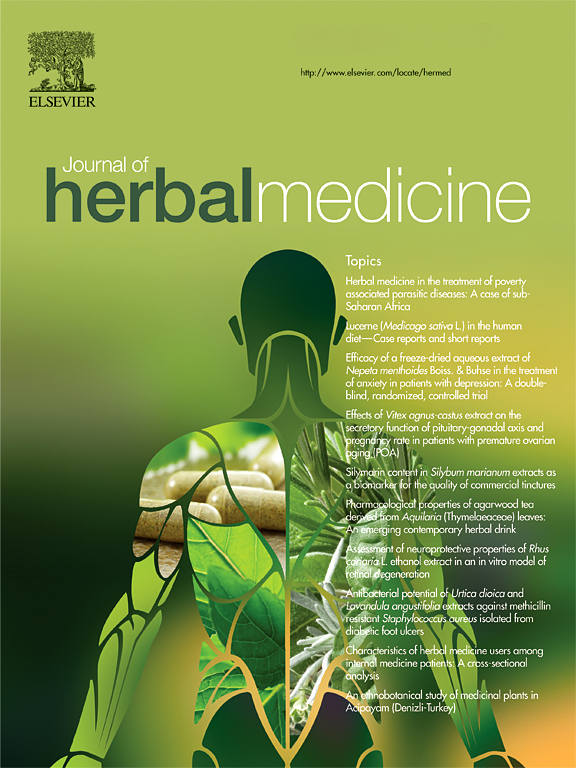A Systematic Review and Meta-analysis of Randomised Controlled Trials on Curcumin-Piperine Supplementation: A Promising Strategy for Managing Lipid Profiles and Liver Health in Non-alcoholic Fatty Liver Disease
IF 1.9
4区 医学
Q2 INTEGRATIVE & COMPLEMENTARY MEDICINE
引用次数: 0
Abstract
Introduction
NAFLD, including simple fatty liver and steatohepatitis, is a widespread condition, driving research into its treatment. This meta-analysis assesses curcumin and piperine effects on lipids and liver enzymes in adults with fatty liver.
Methods
A comprehensive search of various databases (Cochrane, Pubmed, Scopus, Web of Science, Embase) identified a total of 1 419 articles up to September 1, 2024. We used subgroup and sensitivity analyses to detect the source of heterogeneity.
Results
Six studies met the inclusion criteria after thorough screening. Primary outcomes assessed included lipid levels (low-density lipoprotein, triglycerides, high-density lipoprotein, total cholesterol) and liver enzymes (aspartate aminotransferase, alanine aminotransferase), alongside the severity of NAFLD. The result of meta-analysis indicated that curcumin-piperine supplementation led to significant reductions in triglycerides (weighted mean difference [WMD] = −8.27 mg/dl, P < 0.05) and elevated high-density lipoprotein-C levels (WMD = 2.14 mg/dl, P < 0.05). Although non-significant reductions were observed for total cholesterol and low-density lipoprotein-C, aspartate aminotransferase levels significantly decreased (WMD = −1.73 IU/L, P < 0.05), while alanine aminotransferase showed a non-significant decline. Notably, the severity of NAFLD significantly decreased in grade 3 patients (odds ratio = 0.34; 95% CI: 0.14–0.83).
Conclusions
Curcumin-piperine supplementation shows promise in managing liver impairment and lipid abnormalities in NAFLD patients. However, limitations such as the small number of studies and heterogeneity in protocols highlight the need for larger, well-designed trials. While no universally approved pharmacotherapy for NAFLD exists, curcumin-piperine may serve as a complementary or alternative option, warranting further investigation to optimise its therapeutic potential.
补充姜黄素-胡椒碱的随机对照试验的系统评价和荟萃分析:一种有希望的非酒精性脂肪肝患者血脂和肝脏健康管理策略
nafld,包括单纯性脂肪肝和脂肪性肝炎,是一种广泛的疾病,推动着对其治疗的研究。本荟萃分析评估了姜黄素和胡椒碱对成人脂肪肝患者血脂和肝酶的影响。方法综合检索各数据库(Cochrane、Pubmed、Scopus、Web of Science、Embase),截至2024年9月1日共收录1 419篇论文。我们使用亚组分析和敏感性分析来检测异质性的来源。结果经全面筛选,6项研究符合纳入标准。评估的主要结局包括脂质水平(低密度脂蛋白、甘油三酯、高密度脂蛋白、总胆固醇)和肝酶(天冬氨酸转氨酶、丙氨酸转氨酶),以及NAFLD的严重程度。荟萃分析的结果表明,curcumin-piperine补充导致显著减少甘油三酯(加权平均差(大规模杀伤性武器) = −8.27 mg / dl, P & lt; 0.05)和高密度lipoprotein-C水平升高(大规模杀伤性武器 = 2.14 mg / dl, P & lt; 0.05)。虽然总胆固醇和低密度脂蛋白c均无显著降低,但天冬氨酸转氨酶水平显著降低(WMD = −1.73 IU/L, P <; 0.05),而丙氨酸转氨酶则无显著下降。值得注意的是,3级患者NAFLD的严重程度显著降低(优势比 = 0.34;95% ci: 0.14-0.83)。结论补充血cumin -胡椒碱对NAFLD患者的肝损害和脂质异常有良好的治疗效果。然而,研究数量少和方案的异质性等局限性突出表明需要更大规模、设计良好的试验。虽然目前还没有普遍批准的药物治疗NAFLD,姜黄素-胡椒碱可以作为补充或替代选择,需要进一步研究以优化其治疗潜力。
本文章由计算机程序翻译,如有差异,请以英文原文为准。
求助全文
约1分钟内获得全文
求助全文
来源期刊

Journal of Herbal Medicine
INTEGRATIVE & COMPLEMENTARY MEDICINE-
CiteScore
3.90
自引率
0.00%
发文量
94
期刊介绍:
The Journal of Herbal Medicine, the official journal of the National Institute of Medical Herbalists, is a peer reviewed journal which aims to serve its readers as an authoritative resource on the profession and practice of herbal medicine. The content areas of the journal reflect the interests of Medical Herbalists and other health professionals interested in the clinical and professional application of botanical medicines. The objective is to strengthen the research and educational base of herbal medicine with research papers in the form of case studies, original research articles and reviews, monographs, clinical trials and relevant in vitro studies. It also publishes policy statements, opinion pieces, book reviews, conference proceedings and profession related information such as pharmacovigilance reports providing an information source for not only the Herbal Practitioner but any Health professional with an interest in phytotherapy.
 求助内容:
求助内容: 应助结果提醒方式:
应助结果提醒方式:


